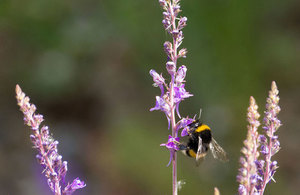Celebrating the nation's Bees' Needs pollinator heroes
Lord Gardiner honours pollinator-friendly projects and urges the public to take action to meet bees' needs this winter.

A solitary bee
An inner-London ‘nectar bar’ and a disused coal mine transformed into a pollen-rich hay meadow are among a range of innovative projects helping protect the nation’s pollinators being celebrated today by Defra Minister Lord Gardiner.
The Bees’ Needs Champions Awards, hosted at the Royal Botanic Gardens, Kew, brings together 30 champions to celebrate bee-friendly initiatives, from playgrounds to parks and farms to famous shopping streets. As winter approaches, bee experts are also calling on the public to take action to keep bees buzzing over winter, with tips on providing homes and food as the temperature drops.
Speaking ahead of the Bees’ Needs Champions Awards, Minister for Rural Affairs and Biosecurity Lord Gardiner said:
Pollinators are essential for food production and the environment. The Bees’ Needs champions show us how to keep our pollinators happy and healthy all year round, and their efforts are an inspiration for us all. They show that whether you have access to acres of land or just a window box, everyone can play a part in helping these vital insects thrive.
The awards celebrate success in six categories: youth groups, schools, local authorities, farming, construction and community groups. They have been judged by a number of organisations on adopting Defra’s National Pollinator Strategy. The champions come from all over England and are responsible for a wide range of projects.
In Sydenham, south London, Grow Mayow community garden features its own nectar bar. Originally an old park keeper depot, it is now home to an award-winning garden with wild flowers and a beehive. Over winter, the garden is planted with a fast-growing ‘green manure’, providing winter food for pollinators and nutrients for the soil.
In Shropshire, the site of a former coal mine was left badly scarred by its industrial past before being turned into a pollinators paradise. The Severn Valley Country Park opened in 1992 and since then volunteers have been looking after five hectares of species‐rich hay meadows and bee hives. Volunteers trained as beekeepers are harvesting mason bee larvae to give to local fruit growers, so young bees can grow and pollinate fruit crops.
Paul de Zylva of Friends of the Earth, one of the organisations working with the Government to put the National Pollinator Strategy into effect, said:
These terrific Pollinator Heroes from across the country show how everyone can help bees and pollinators anytime, anyplace, anywhere—all year round and wherever we live.
The beauty is, you don’t have to wait for summer to start playing your part in reversing bee and pollinator decline. Taking action also helps bring the National Pollinator Strategy alive in homes, at work, at school and in your community. Let’s all be part of the generation to save our bees.
While the natural lifecycle of many bees in the UK means you will see them less often, pollinators still need food and shelter to survive the winter. Calling for everyone to take action to help bees and pollinators over the winter, Lord Gardiner added:
Bees are a much-loved feature of English summertime and crucial contributors to our biodiversity and our economy. But it is important not to forget bees’ needs during the winter months too, when providing food and a home are more important than ever.
Planting evergreens for winter food and leaving areas of gardens undisturbed through the winter to provide homes mean we can all help pollinators emerge safely in the spring.
Experts have highlighted a number of easy steps everyone can take to help pollinators over the winter:
-
Plant flowers, shrubs and trees that thrive in winter. The evergreen mahonia is excellent winter food for bees, while the pendant bells of winter flowering clematis can give pollinators a sugary energy boost. Ivy plants are also an ideal source of food for bees in late autumn - avoid cutting them down.
-
Leave suitable places for hibernation undisturbed. Letting areas of a lawn grow long until the spring can provide a hibernation home while cool, north-facing banks are ideal places for bees to burrow. The hollow tubes of dead stems of plants in borders can also serve as a great nesting spot.
-
Plant early flowering bulbs like crocus, primrose, snowdrop of coltsfoot that flower in February and March to help support bees and pollinators looking for an early feed. Winter is also the perfect time to plant bee-friendly trees, such as acacia, blackthorn and hazel.
Further information
Find out more about the Bees’ Needs campaign and read the National Pollinator Strategy.
For more information on this press release call Defra press office on 020 8026 3005 or out of hours on 0345 051 8486.